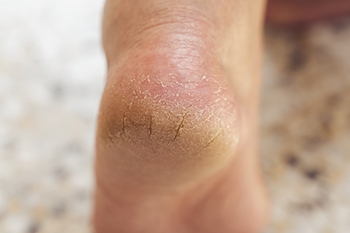
Skin fissures are painful cracks that can develop due to dryness and thickened skin. They are common on the heels, often associated with dryness. Fissures can be superficial or deep and may lead to skin ulcers if left untreated. Various factors contribute to skin fissures, including nutritional deficiencies, dry skin conditions, fungal infections, diabetes, and damage to blood vessels. Lifestyle factors like dehydration, frequent washing, climate, profession, and inappropriate footwear can exacerbate dry skin. Treatment depends on the depth of the fissures. Superficial fissures can be managed with daily foot checks, gentle use of a pumice stone, moisturizer application, and protective bandages. Deeper fissures may require debridement, prescription-strength softeners, skin glue, strapping, antibiotics, and heel support. Regular moisturizing and investigating underlying health conditions are vital for effective management and prevention. If you have cracked heels that appear to be worsening, infected, or turning into fissures, it is strongly suggested that you schedule an appointment with a podiatrist for advanced treatment.
If the skin on your feet starts to crack, you may want to see a podiatrist to find treatment. If you have any concerns, contact one of our podiatrists from Summit Podiatry. Our doctors can provide the care you need to keep you pain-free and on your feet.
Cracked Heels
It is important to moisturize your cracked heels in order to prevent pain, bleeding, and infection. The reason cracked heels form is because the skin on the foot is too dry to support the immense pressure placed on them. When the foot expands, the dry skin on the foot begins to split.
Ways to Help Heal Them
- Invest in a good foot cream
- Try Using Petroleum Jelly
- Ease up on Soaps
- Drink Plenty of Water
Ways to Prevent Cracked Heels
- Moisturize After Showering
- Skip a Shower
- Keep Shower Water Lukewarm
- Don’t Scrub Your Feet
If you are unsure how to proceed in treating cracked heels, seek guidance from a podiatrist. Your doctor will help you with any questions or information you may need.
If you have any questions, please feel free to contact one of our offices located in Wilmington, Whiteville, and Wallace, NC . We offer the newest diagnostic and treatment technologies for all your foot care needs.
